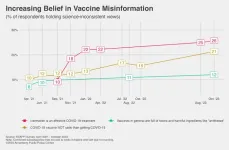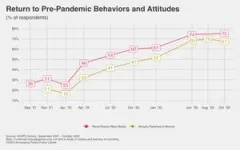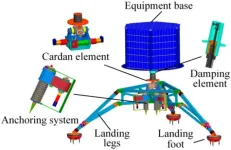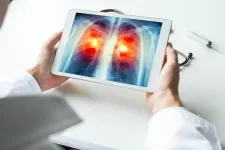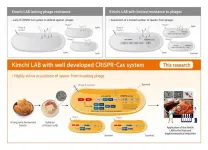(Press-News.org) PHILADELPHIA – Americans have less confidence in vaccines to address a variety of illnesses than they did just a year or two ago, and more people accept misinformation about vaccines and Covid-19, according to the latest health survey from the Annenberg Public Policy Center (APPC) of the University of Pennsylvania.
The survey conducted October 5-12, 2023, with a panel of over 1,500 U.S. adults, finds that the number of Americans who think vaccines approved for use in the United States are safe dropped to 71% from 77% in April 2021. The percentage of adults who don’t think vaccines approved in the U.S. are safe grew to 16% from 9% over that same two-and-a-half-year period.
Despite concerted efforts by news organizations, public health officials, scientists, and fact-checkers (including APPC’s project FactCheck.org) to counter viral misinformation about vaccination and Covid-19, the survey finds that some false or unproven claims about them are more widely accepted today than two to three years ago. Although the proportion of the American public that holds these beliefs is, in some cases, still relatively small, the survey finds growth in misinformation acceptance across many questions touching on vaccination.
“There are warning signs in these data that we ignore at our peril,” said Kathleen Hall Jamieson, director of the Annenberg Public Policy Center and director of the survey. “Growing numbers now distrust health-protecting, life-saving vaccines.”
Highlights
Covid-19 vaccine: Less than two-thirds of Americans (63%) think is it safer to get the Covid-19 vaccine than the Covid-19 disease, a decline from 75% in April 2021.
Ivermectin: Over a quarter (26%) incorrectly think ivermectin is an effective treatment for Covid-19, up dramatically from 10% in September 2021.
Autism: A small but growing number (16%) believe that “increased vaccines are why so many kids have autism these days,” up from 10% in April 2021.
Return to normal: Asked when they expected to return to their normal, pre-Covid life, two-thirds (67%) say they already have. Three-quarters (75%) say they never or rarely wear a mask or face covering.
APPC’s Annenberg Science and Public Health Knowledge survey
The survey data come from the 13th wave of a nationally representative panel of 1,559 U.S. adults, first empaneled in April 2021, conducted for the Annenberg Public Policy Center by SSRS, an independent market research company. This wave of the Annenberg Science and Public Health Knowledge (ASAPH) survey was fielded October 5-12, 2023, and has a margin of sampling error (MOE) of ± 3.4 percentage points at the 95% confidence level. All figures are rounded to the nearest whole number and may not add to 100%. Combined subcategories may not add to totals in the topline and text due to rounding.
The policy center has been tracking the American public’s knowledge, beliefs, and behaviors regarding vaccination, Covid-19, flu, RSV, and other consequential health issues through this survey panel over the past two-and-a-half years. In addition to Jamieson, the APPC team on this survey includes research analyst Shawn Patterson Jr., who analyzed the data; Patrick E. Jamieson, director of the Annenberg Health and Risk Communication Institute, who developed the questions; and Ken Winneg, managing director of survey research, who supervised the fielding of the survey.
Download the topline and the methods report.
Growing acceptance of vaccine misinformation
Beliefs in vaccine misinformation are on the rise:
Vaccinations affecting childhood autism: There’s been a decline in the number of people who know it is false to say that “increased vaccinations are why so many kids have autism these days,” dropping to 65% from 71% in April 2021. The number of people who believe that this is true has grown to 16% from 10% over that period. The Centers for Disease Control and Prevention (CDC) says that vaccines do not cause autism.
Growing belief in false MMR-autism link: Asked if it is true or false that vaccines given to children for diseases like measles, mumps, and rubella (MMR) cause autism, 12% incorrectly say this is true, up from 9% in June 2021, a statistically significant rise. Most people (70%) correctly say that this allegation is false. According to the CDC, vaccine experts say “the MMR vaccine is not responsible for increases in the number of children with autism.”
Flu shot and Covid-19: There was a small but statistically significant increase in the number of people who incorrectly think that getting a flu shot increases your risk of contracting Covid-19 – 9% say this is true, up from 6% in January 2023. As pointed out in a story by FactCheck.org, there is no evidence a flu shot increases the risk of Covid-19.
Growing belief that vaccines contain toxins: More than 1 in 10 people (12%) now incorrectly believe it is true that “vaccines in general are full of toxins and harmful ingredients like ‘antifreeze,’” a significant increase from 8% in April 2021. Although most people (73%) know this is false, that number has declined from 77% in June 2021. FactCheck.org notes that flu ingredients are safe in this story and writes about the ingredients in Covid-19 vaccines here. A look at the ingredients in vaccines is here.
Ivermectin to treat Covid-19: Over a quarter (26%) incorrectly say ivermectin is an effective treatment for Covid-19, up from 10% in September 2021. The percentage who know this is false also rose, to 37% from 27% in September 2021. Overall, the number of people who are unsure declined, to 38% from 63%. The Food and Drug Administration (FDA) has not authorized or approved the use of ivermectin for treating or preventing Covid-19 in humans or animals, and says current data do not show it is effective against Covid-19.
Cancer and mRNA vaccines: 12% of those surveyed say it is true that mRNA vaccines against Covid-19 “cause cancer,” up from 9% in January 2023. The number who believe this is false remained steady at 58%. There is no evidence Covid-19 vaccines cause or “accelerate” cancer, according to FactCheck.org.
In addition, many do not know that the flu vaccine cannot give you the flu: Just half of those surveyed (51%) know that the seasonal flu shot distributed in the U.S. cannot give you flu, while nearly 3 in 10 people (29%) think that is false. This finding is statistically unchanged since January. The CDC says the flu vaccine cannot cause flu.
Less confidence in vaccine safety
Declining belief that vaccines are safe: Although most people (71%) agree that vaccines approved for use in the U.S. are safe, that is down significantly from 77% in April 2021. More people (16%) think it false to state that vaccines in the U.S. are safe than in January 2022 (11%). FactCheck.org examines what is known about vaccine safety.
Less confidence in Covid-19 vaccine: Less than two-thirds (63%) say it is safer to get the Covid-19 vaccine than to get the disease Covid-19, a significant drop from 77% in November 2021. And the number of people who say it is false to state that the vaccine is safer than the disease is up to 21%, more than doubling from 10% in April 2021.
Safety of specific vaccines
The public has widely varying opinions about the safety of individual vaccines – but several of those we asked about are perceived as less safe today than 14 months earlier in an August 2022 wave of this survey. The MMR, Covid-19, and pneumonia vaccines are all regarded as less safe than in the earlier survey.
Beliefs in the safety of individual vaccines range from 81% for the long-established vaccines for the seasonal flu and MMR (measles, mumps, and rubella) to 50% for the vaccine approved in August by the FDA for pregnant people to protect their infants from respiratory syncytial virus, or RSV. The significant declines are marked with an*:
MMR vaccine*: 81% say the MMR vaccine is safe (down significantly from 88% in August 2022), while 9% say it is unsafe and 10% are not sure.
Flu vaccine: 81% say the flu vaccine is safe (no significant change from August 2022), while 11% say it is unsafe and 8% are not sure.
Shingles vaccine: 78% say the shingles vaccine is safe (no significant change from August 2022), while 7% say it is unsafe and 15% are not sure.
Pneumonia vaccine*: 74% say the pneumonia vaccine is safe (down significantly from 80% in August 2022), while 8% say it is unsafe and 18% are not sure.
HPV vaccine: 65% say the vaccine for HPV, human papillomavirus, is safe (no significant change from August 2022), while 11% say it is unsafe and 24% are not sure.
Covid-19 vaccine*: 66% say the Covid-19 vaccine is safe (down significantly from 73% in August 2022), while 24% say it is unsafe and 10% are not sure.
RSV vaccine for older adults: 62% say the RSV vaccine for people 60 and older is safe, while 11% say it is unsafe, and 27% are not sure. This vaccine was first approved by the FDA in May 2023; this question was not asked last year.
RSV for pregnant people: Just half (50%) say the vaccine given to pregnant people to protect their infants from RSV is safe, while 13% say it is unsafe, and over a third (38%) are not sure. This vaccine was approved by the FDA in August 2023; this question was not asked last year.
Effectiveness of different vaccines
Public perceptions of the effectiveness of some vaccines have also declined over the past 14 months. The perceived effectiveness of the vaccines for MMR, flu, pneumonia, and HPV all had statistically significant drops since August 2022 and are marked with an *. Large percentages of people are unsure of whether the new RSV vaccines are effective. When asked how effective these vaccines are at preventing symptomatic disease, survey respondents say:
MMR vaccine*: 83% effective (down significantly from 87% in August 2022)
Flu vaccine*: 75% effective (down significantly from 81% in August 2022)
Shingles vaccine: 73% effective (no significant change)
Pneumonia vaccine*: 69% effective (down significantly from 74% in August 2022)
Covid-19 vaccine: 65% effective (no significant change)
HPV vaccine*: 61% effective (down significantly from 66% in August 2022)
RSV vaccine for older adults: 54% effective (37% not sure)
RSV vaccine for pregnant persons to protect their infants from RSV: 42% effective (47% not sure)
Lives returning to normal
Return to normal: Growing numbers of Americans say they have returned to their normal, pre-Covid lives. Asked when they expect to be able to return to their normal, pre-Covid life, 67% say they already have, significantly higher than in January (52%). However, this is not true for a small but persistent group who see life as forever changed. One in 5 Americans (20%) say they will never return to their normal, pre-Covid lives, more than in June 2023 (16%).
Mask-wearing: Asked how often you wear a mask or face covering indoors when with people who are not part of your household, 75% say never or rarely (statistically unchanged from June) – with 53% of those saying they never wear one. Another 21% say they sometimes, often, or always wear a mask or face covering, and 4% say they don’t go places where they might come in contact with people who are not in their household.
Download the topline with data for wave 13 of the survey.
The Annenberg Public Policy Center was established in 1993 to educate the public and policy makers about communication’s role in advancing public understanding of political, science, and health issues at the local, state, and federal levels. Read about our science and health surveys.
END
Vaccine confidence falls as belief in health misinformation grows
Americans see some vaccines as less safe and effective today than last year
2023-11-01
ELSE PRESS RELEASES FROM THIS DATE:
How the relationship between the land and atmosphere facilitated the persistence of eastern China’s extreme weather and climate in summer 2022?
2023-11-01
Extreme weather and climate events, such as droughts, heatwaves, and rainstorms, pose serious threats to human health, agricultural production, and energy supplies. These events often occur at the same time, and such "compound extreme events" can cause far more damage than any one single event. Climate scientists from the research group of Prof. Aihui Wang from the Institute of Atmospheric Physics, Chinese Academy of Sciences, Beijing, China, argue in a new study that land–atmosphere coupling (the coupling ...
Immune checkpoint inhibition, when administered together with single fraction stereotactic radiosurgery, does not appear to increase risk of radiation necrosis in patients with brain metastases
2023-11-01
MIAMI, FL – November 1, 2023 -- Miami Cancer Institute, part of Baptist Health South Florida, announced the publication of a multi-institutional retrospective cohort study about the impact of immune checkpoint inhibition (ICI) and single-fraction stereotactic radiosurgery (SRS) on radiation necrosis (RN) in patients with brain metastasis from non-small cell lung cancer. The study, titled “Immune Checkpoint Inhibition and Single Fraction Stereotactic Radiosurgery in Brain Metastases from Non-Small Cell Lung Cancer: An International Multicenter Study of 395 Patients” ...
Scientists developed a legged small celestial body landing mechanism for landing simulation and experimental test
2023-11-01
Landing stably is the precondition for exploring the small celestial body in situ. The surface of small body is weak gravity and irregular, and the surface environment is unknown and uncertain. The landing mechanism tends to rebound and turn over, and the landing stability time is long. However, there is difference on the Moon and the Mars surface while most of the landing performance researches are focused on the lunar landing so far. Therefore, it is of great important to study the landing ...
American Cancer Society updates lung cancer screening guideline: Nearly five million US adults who smoke and formerly smoked now recommended for testing
2023-11-01
ATLANTA, November 1, 2023 — Today, the American Cancer Society (ACS) released an update of its lung cancer screening guideline to help reduce the number of people dying from the disease due to smoking history. The new guideline recommends yearly screening for lung cancer for people aged 50 to 80 years old who smoke or formerly smoked and have a 20-year or greater pack-year history. The recommended annual screening test for lung cancer is a low-dose computed tomography scan (also called a low-dose CT scan, or LDCT). The guideline, last updated ...
Rethinking quality: UNU-convened experts challenge the harmful influence of global university rankings
2023-11-01
Kuala Lumpur, 1 November 2023
An Independent Expert Group (IEG) convened by the United Nations University’s International Institute for Global Health (UNU IIGH) has released a strong statement criticizing the wide and uncritical use of global university rankings.
The IEG highlights the vital importance of universities in delivering not just education, training, and research, but also in shaping public policy, promoting informed public discourse, and helping advance democracy and human rights.
However, although marketed as a tool for improving university performance and providing information to prospective students, the statement describes how global university ...
Women face greater risk of obesity in low- and middle-income countries
2023-11-01
WASHINGTON—Women in low- and middle-income countries, especially in the Sub-Saharan Africa region, may be 10 times more likely to have obesity or heart health issues than their male counterparts, according to a large meta-analysis published in The Journal of Clinical Endocrinology & Metabolism.
Obesity is a chronic disease characterized by an individual having an excess of body fat or abnormal fat accumulation. People who have obesity are at an increased risk for other serious ...
The American Pediatric Society honors Dr. Alan Jobe with the 2024 APS John Howland award
2023-11-01
The American Pediatric Society (APS) is pleased to announce Alan Jobe, MD, PhD, as the 2024 APS John Howland Award recipient, the highest honor bestowed by the APS. The prestigious award signifies the society’s recognition of Dr. Jobe for his significant contributions to advancing child health and the profession of pediatrics. The award will be presented to Dr. Jobe during the APS Presidential Plenary at the Pediatric Academic Societies 2024 Meeting in Toronto, Ontario, May 2 – May 6.
The ...
NEA award supports study of music therapy to improve chronic pain
2023-11-01
INDIANAPOLIS -- Regenstrief Institute research scientist Matthew J. Bair, M.D., M.S., and the Indiana Institute of Medical Research (IIMR) at Richard L. Roudebush VA Medical Center have been awarded the Creative Forces®: National Endowment for the Arts Military Healing Arts Network Award for Clinical Study of Music Therapy and Chronic Pain in U.S. Veterans.
The research project titled “Stepped-Care Intervention of Music and Imagery to Assess Relief (SCIMITAR) Trial” will test whether a two-step music therapy intervention ...
Research team at World Institute of Kimchi discovers lactic acid bacteria strains with high virus resistance from kimchi
2023-11-01
Researchers at the World Institute of Kimchi have isolated lactic acid bacteria (LAB) strains with high levels of resistance to phages from kimchi fermented at low temperatures for a long period of time. They have also identified the defense mechanism of the LAB strains against phages, viruses that infect and replicate within bacteria.
Kimchi, a traditional Korean food, is a lactic acid-fermented vegetable product. Unlike fermented dairy products, which are produced under a sterilized-closed fermentation system, kimchi is produced through spontaneous fermentation initiated by various microorganisms present in the raw materials under a non-sterilized-open fermentation system. Thus, ...
CU Ophthalmology researcher funded to study Parkinson's disease biomarkers
2023-11-01
For some, the eyes are a window into the soul. But for Jayashree Kalpathy-Cramer, PhD, professor of ophthalmology at the University of Colorado School of Medicine, they're a window into human health.
The researcher was granted $300,000 by The Michael J. Fox Foundation this fall to analyze clinical data curated at the Sue Anschutz-Rodgers Eye Center using artificial intelligence (AI) in an effort to identify biomarkers of Parkinson’s disease, a progressive disorder that affects the nervous system and causes uncontrollable movements, such as shaking, throughout the body.
“This approach could be impactful ...
LAST 30 PRESS RELEASES:
Alkali cation effects in electrochemical carbon dioxide reduction
Test platforms for charging wireless cars now fit on a bench
$3 million NIH grant funds national study of Medicare Advantage’s benefit expansion into social supports
Amplified Sciences achieves CAP accreditation for cutting-edge diagnostic lab
Fred Hutch announces 12 recipients of the annual Harold M. Weintraub Graduate Student Award
Native forest litter helps rebuild soil life in post-mining landscapes
Mountain soils in arid regions may emit more greenhouse gas as climate shifts, new study finds
Pairing biochar with other soil amendments could unlock stronger gains in soil health
Why do we get a skip in our step when we’re happy? Thank dopamine
UC Irvine scientists uncover cellular mechanism behind muscle repair
Platform to map living brain noninvasively takes next big step
Stress-testing the Cascadia Subduction Zone reveals variability that could impact how earthquakes spread
We may be underestimating the true carbon cost of northern wildfires
Blood test predicts which bladder cancer patients may safely skip surgery
Kennesaw State's Vijay Anand honored as National Academy of Inventors Senior Member
Recovery from whaling reveals the role of age in Humpback reproduction
Can the canny tick help prevent disease like MS and cancer?
Newcomer children show lower rates of emergency department use for non‑urgent conditions, study finds
Cognitive and neuropsychiatric function in former American football players
From trash to climate tech: rubber gloves find new life as carbon capturers materials
A step towards needed treatments for hantaviruses in new molecular map
Boys are more motivated, while girls are more compassionate?
Study identifies opposing roles for IL6 and IL6R in long-term mortality
AI accurately spots medical disorder from privacy-conscious hand images
Transient Pauli blocking for broadband ultrafast optical switching
Political polarization can spur CO2 emissions, stymie climate action
Researchers develop new strategy for improving inverted perovskite solar cells
Yes! The role of YAP and CTGF as potential therapeutic targets for preventing severe liver disease
Pancreatic cancer may begin hiding from the immune system earlier than we thought
Robotic wing inspired by nature delivers leap in underwater stability
[Press-News.org] Vaccine confidence falls as belief in health misinformation growsAmericans see some vaccines as less safe and effective today than last year
